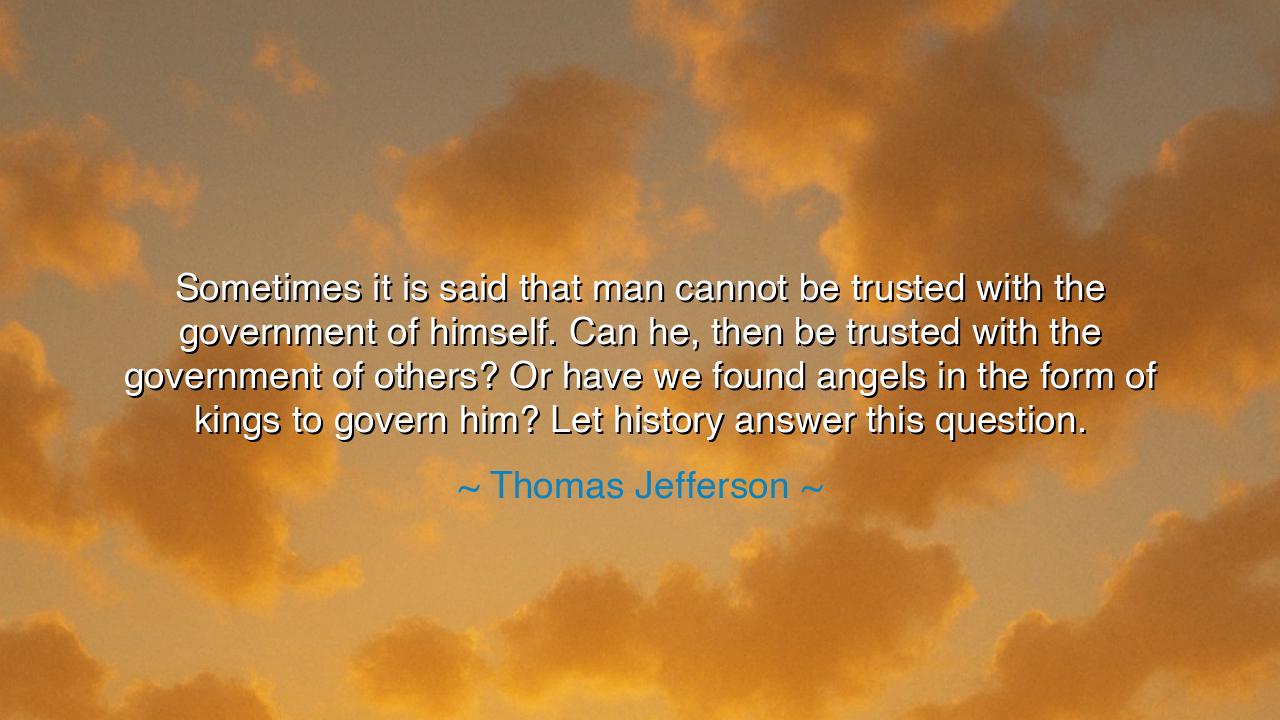
Sometimes it is said that man cannot be trusted with the
Sometimes it is said that man cannot be trusted with the government of himself. Can he, then be trusted with the government of others? Or have we found angels in the form of kings to govern him? Let history answer this question.






The words of Thomas Jefferson — “Sometimes it is said that man cannot be trusted with the government of himself. Can he, then, be trusted with the government of others? Or have we found angels in the form of kings to govern him? Let history answer this question.” — rise like a trumpet call across the ages. They are not the musings of a dreamer, but the fierce challenge of a man who believed in the dignity and reason of humankind. With these words, Jefferson struck at the heart of tyranny and declared, in the simplest of logic, the deepest of truths: if men are too flawed to rule themselves, then they are certainly too flawed to rule one another. No crown, no title, no divine claim can change that fact. For there are no angels among us — only men, capable of both virtue and error, and therefore fit to govern only by consent, never by command.
These words were born in the fire of revolution, drawn from Jefferson’s First Inaugural Address in 1801. The young republic still trembled in its infancy, surrounded by monarchies that sneered at the experiment of liberty. Many in Europe — and even some in America — doubted that common people could manage their own affairs without falling into chaos. Jefferson’s question was his answer: if man cannot be trusted with himself, how can he be trusted with others? It was a blow struck against every throne and tyranny in the world, a rejection of the idea that kings were wiser, purer, or more divine. Government by consent — not government by blood or by sword — was the sacred inheritance he proclaimed.
In the spirit of the ancients, his reasoning is both profound and humbling. For centuries, the rulers of the earth had called themselves the chosen of the gods — Pharaohs of Egypt, emperors of Rome, monarchs of Europe — all claiming a divine right to command. They said the people were too ignorant, too sinful, too weak to rule themselves. Jefferson, like the philosophers before him — like Socrates, Cicero, and Locke — saw this as the oldest lie of power. “If all men are flawed,” he asked, “then what makes a ruler any less so?” Power does not make angels of men; it only magnifies their vices.
History has answered Jefferson’s question time and again. The kings of old governed not as angels, but as tyrants — from Nero, who burned his own city, to Louis XVI, whose excess helped bring down a kingdom. The empires they built were monuments to arrogance, and the ruins they left were the cost of mankind’s faith in authority. Jefferson’s wisdom came from these ruins. He had studied them as one studies the bones of the fallen, and he saw in them a lesson for all ages: when one man rules another, liberty dies; when all men rule themselves, liberty lives. Thus, his words are not only the foundation of democracy — they are a testament to the humility that true governance requires.
And yet, Jefferson’s teaching is not naïve. He knew that men are imperfect, that self-government is no guarantee of justice. But he believed, as all the wise have believed, that freedom is not given to the perfect — it is given to those willing to bear its burden. The strength of democracy lies not in the perfection of its citizens, but in their capacity for correction, their willingness to learn, to fail, and to rise again. To govern oneself is to wrestle with imperfection and still choose principle over power. The alternative — to surrender one’s will to rulers — is not order, but servitude.
Consider the tale of England’s Glorious Revolution, when the people cast off the absolutism of James II and declared that kings, too, must obey the law. That moment, like Jefferson’s America, proved that ordinary people, guided by conscience and reason, could build a government without divine right or royal decree. It was not angels who wrote their laws, but men — and because they were men, they knew to place limits on themselves. The lesson is eternal: freedom does not require saints, only citizens.
So let this be the teaching to every generation: distrust all who claim moral superiority to rule over others. No man, no party, no ruler holds a monopoly on wisdom or virtue. The only safeguard of liberty is shared responsibility — the courage of every soul to think, to act, and to question. When the people become passive, they create the very tyrants they once overthrew. But when they remain vigilant — when they remember Jefferson’s question and answer it with their lives — then the flame of freedom burns undimmed.
And thus, remember this truth as if carved in stone: we are not angels, and so none among us may rule as one. The measure of a just society is not in the holiness of its leaders, but in the freedom of its citizens. Let history answer, as Jefferson said, for it always has — the hand that governs best is the hand that governs least, and the heart that remains free is the one that trusts itself above all kings.






AAdministratorAdministrator
Welcome, honored guests. Please leave a comment, we will respond soon